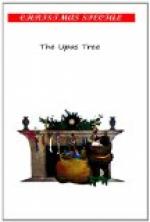He particularly disliked milk, and was not fond of sponge-cakes; but he hastily drank the one and ate the other. He could think of no other way of disposing of them. He hoped the young women who were watching him from behind the counter, would think he enjoyed them.
Then he called for a whisky and soda, to take out the exceedingly beastly taste of the milk; but instantly remembered that old Dick had said: “Touch no alcohol,” so changed the order to another cup of coffee.
This second instalment of coffee made him feel extraordinarily fit and vigorous.
He put the Infant back into its bag.
The inspector returned.
“We have found your luggage, Mr. West,” he said. “If we may have your keys we can get it out for you.”
“Ah, do!” said Ronnie. “Many thanks. Put it on a taxi. I shall leave it at my Club. I am afraid I was rather vague about it just now; but I had been given a sleeping draught on board, and was hardly awake when I got out of the train. I am all right now. Thanks for your help, my good fellow.”
The inspector looked relieved.
Ronnie paid his bill, took up the ’cello, handed his bag to the inspector, and marched off gaily to claim his luggage.
He felt like conquering the world! The fog was lifting. The roar of the city sounded more natural. He had an excellent report to make to his publisher, heaps of “copy” to show him, and then—he was going home to Helen.
In the taxi he placed the Infant on the seat beside him.
On the whole he felt glad he had told Helen not to meet him at the station. It was so much more convenient to have plenty of room in the taxi for his ’cello. It stood so safely on the seat beside him, in its canvas bag.
As they sped westward he enjoyed looking out at the fog and mud and general wintry-aspect of London.
He did not feel cold. Aubrey had persuaded him to buy a magnificent fur-coat at the Hague. He had lived in it ever since, feeling gorgeous and cosy. Aubrey’s ideas of spending money suited him better than Helen’s.
His taxi glided rapidly along the greasy Embankment. Once it skidded on the tramlines, and Ronnie laid a steadying hand upon the ’cello.
The grey old Thames went rolling by—mighty, resistless, perpetually useful—right through the heart of busy London.
Ronnie thought of the well-meaning preacher who pointed out to his congregation, as an instance of the wonderful over-rulings of an All-wise Providence, the fact that large rivers flowed through great cities, and small streams through little villages! Ronnie laughed very much at the recollection of this story, and tried to remember whether he had ever told it to Helen.
Arrived at his club he shaved, tubbed, changed his clothes, and, leaving his ’cello in charge of the hall porter, sallied out with his manuscript to call upon his publisher.




